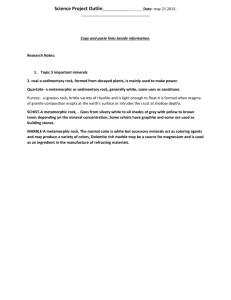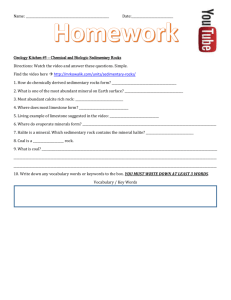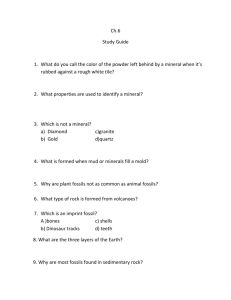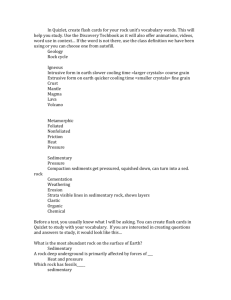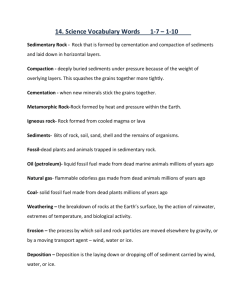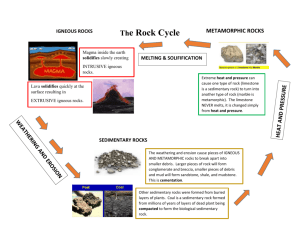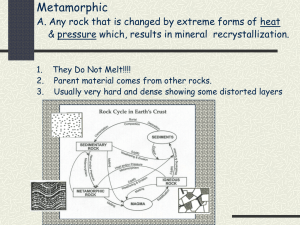6 - rock 5
advertisement
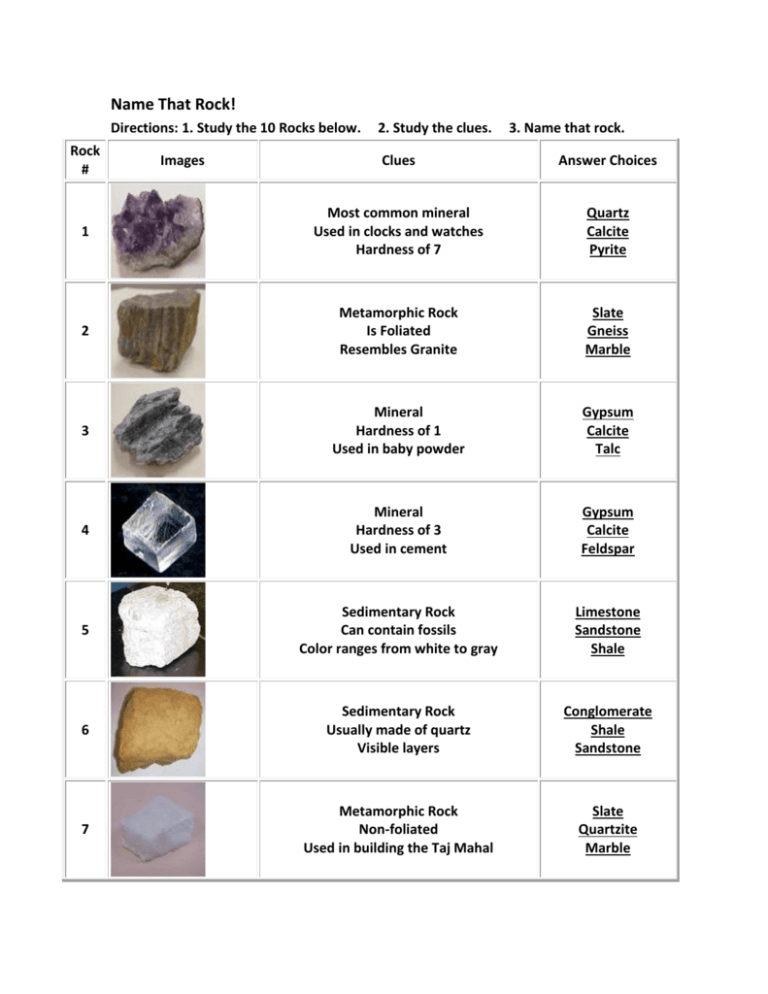
Name That Rock! Directions: 1. Study the 10 Rocks below. Rock # Images 2. Study the clues. 3. Name that rock. Clues Answer Choices 1 Most common mineral Used in clocks and watches Hardness of 7 Quartz Calcite Pyrite 2 Metamorphic Rock Is Foliated Resembles Granite Slate Gneiss Marble 3 Mineral Hardness of 1 Used in baby powder Gypsum Calcite Talc 4 Mineral Hardness of 3 Used in cement Gypsum Calcite Feldspar 5 Sedimentary Rock Can contain fossils Color ranges from white to gray Limestone Sandstone Shale 6 Sedimentary Rock Usually made of quartz Visible layers Conglomerate Shale Sandstone 7 Metamorphic Rock Non-foliated Used in building the Taj Mahal Slate Quartzite Marble 8 Igneous Rock Looks like glass Comes from volcanoes Basalt Obsidian Scoria 9 Igneous Rock Large crystals Used in Buildings and Monuments Granite Scoria Pumice 10 Metamorphic Rock Non-foliated Made from sandstone Slate Pumice Quartzite 1 2 3 4 5 6 7 8 9 10 11 12 13 14 15 16 17 18 Down Across 2. A hard material that is made up of one or more minerals. 3. A metamorphic rock that does not appear to be layered. 5. How a mineral breaks apart when a tool, such as a hammer, is used to break it. A mineral that exhibits this will break into smooth pieces. 7. The process in which magma cools and hardens into rock. 9. When a mineral is ground into powder, this is the color of the powder. Sometimes this powder is not the same color as the original mineral. 10.Rock made of bits of sedimentary material that was compacted in layers. (2 words) 11.A metamorphic rock that has visible layers or bands. 14.The changing and evolution of rocks from one type of rock to another that takes place over time. (2 words) 16.Rock formed by the cooling of molten magma or from lava. 1. The resistance a mineral has to being scratched. 4. Packed down, as in sediment that becomes rock. 6. A rock that is formed by adding heat, pressure, or chemicals to another rock. 8. A nonliving, solid material that was formed in nature and has particles arranged in a repeating pattern. 9. A type of rock that forms at Earth's surface. This rock may form from material that has been squeezed together or it may form from the material that is left after the evaporation of water. 12.The formation of large rocks from particles of sediment that occurs as pressure is applied. 13.A property of minerals that is used to describe how a mineral reflects light. 15.A type of physical weathering in which rocks are gradually worn down. 17.A scientist who studies the earth. 18.The process in which moving sedimentary material slows down, or from ice that melts. Igneous Mineral Erosion Sedimentary Clastic Rock Hardness Rock Cementation Metamorphic Rock Cycle Deposition Geologist Foliated Non-foliated Crystallization Luster Compacted Streak Cleavage Answer Key 1 3 4 C H A N O 8 M I M P L U F L O E R A 6 M 9 A T L A T R A G S T E 14 E T E D A M O S S A C E T R P H I C E R 7 C R V 12 N L I C D K A 10 13 N C R O N 5 2 M D S E E D I M E O I C 16 I C K 1 7 G R C O T A R Y S 11 N T A T I A T N F O T N A L 15 K E R O S I L O N L A I T Z N E A Y E D T C C O I K L U O E S Answer Key: 6 - rock 5 - lava 1 - magma 3 - basalt 10 - sediments 4 - slate 2 - limestone 9 - igneous 11 - sedimentary 7 - metamorphic 12 - compaction 8 - cementation E O L 18 D O E G P I O S S I T I O N Name: _________________________________ Date: __________ Rocks and Minerals Worksheet Use the following words: _____ rock 1) melted rock beneath the earth's surface _____ lava 2) example of sedimentary rock _____ magma 3) example of igneous rock _____ basalt 4) example of metamorphic rock _____ sediments 5) melted rock above the earth's surface _____ slate 6) a solid material made up of minerals _____ limestone 7) rocks that form under pressure and heat within the earth _____ igneous 8) causes sediments to stick together _____ sedimentary 9) a rock that forms when melted rock cools and hardens _____ metamorphic 10) tiny pieces of rock _____ compaction 11) rocks that form from sediments _____ cementation 12) presses sediments together
